
CBD for Dogs with Endocrine Disorders: Insights into Cushing's Disease
CBD for Dogs with Endocrine Disorders: Insights into Cushing's Disease
Nothing crushes a pet parent like seeing their dog in pain and sick. Cushing's disease is one of the illnesses some unfortunate dog owners need to deal with.
The disease starts with mild signs but progresses gradually to full-blown symptoms that affect your dog's quality of life. Although Cushing's disease is found more in older dogs and certain breeds, young dogs aren't immune.
However, having Cushing's disease doesn't mean your dog can't live a normal and healthy life. In this article, we explore how CBD oils can be used to provide relief for dogs with Cushing's disease.
 Is CBD Effective for Dogs with Endocrine Disorders?
Is CBD Effective for Dogs with Endocrine Disorders?
Cushing's disease has a couple of causes. It can occur when the pituitary glands stimulate excessive cortisol production. Cortisol is a hormone that helps with stress; however, excess levels lead to Cushing's disease.
The disease can also be caused by an adrenal tumor which affects the functioning of the gland, resulting in a cascade of issues. Although there are medications approved by the FDA to treat Cushing's, many pet owners prefer natural alternatives such as CBD from the hemp plant, which helps to relieve pain and discomfort.
It works with the endocannabinoid system to regulate cortisol production, reduce inflammation, and improve the dog's overall health.
 Understanding Cushing's Disease in Dogs
Understanding Cushing's Disease in Dogs
Many pet owners miss or brush off the early symptoms of the disease because its initial symptoms are mild. However, it's crucial that when you do notice these early signs, you take your dog to the vet for a proper diagnosis and to rule out other underlying issues.
Causes, Symptoms, Diagnosis, and Impact of Cushing's Disease
Cushing's disease happens when there is too much cortisol in the body. Medically, the disease is known as "hyperadrenocorticism".
Normally, cortisol is a dog's natural steroid and plays a crucial role in their overall health. It helps in maintaining body weight, fighting stress, and keeping infections at bay.
However, when the body produces too much cortisol, it does more harm than good. For example, Cushing's disease affects the dog's immune system leaving them vulnerable to infections.
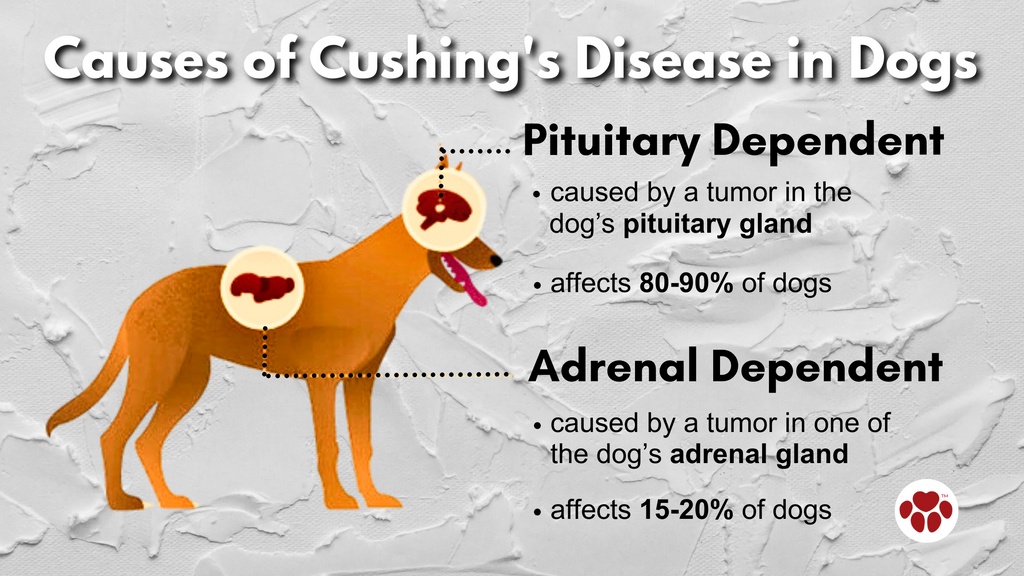
What causes Cushing's disease in dogs?
There are a few different causes of Cushing's disease:
-
In pituitary-dependent Cushing's, a tumor in the pituitary gland produces excess adrenocorticotropic hormone (ACTH). The hormone travels through the bloodstream to the adrenal glands and triggers excess cortisol production.
-
In adrenal-dependent Cushing's, the tumor develops on an adrenal gland, which produces too much cortisol (despite normal ACTH levels).
- In very rare cases, the disease can occur when a dog is over-medicated with steroids. This is known as iatrogenic Cushing's syndrome.
A diagnosis must be made by a veterinarian because treatment varies depending on the cause and type.
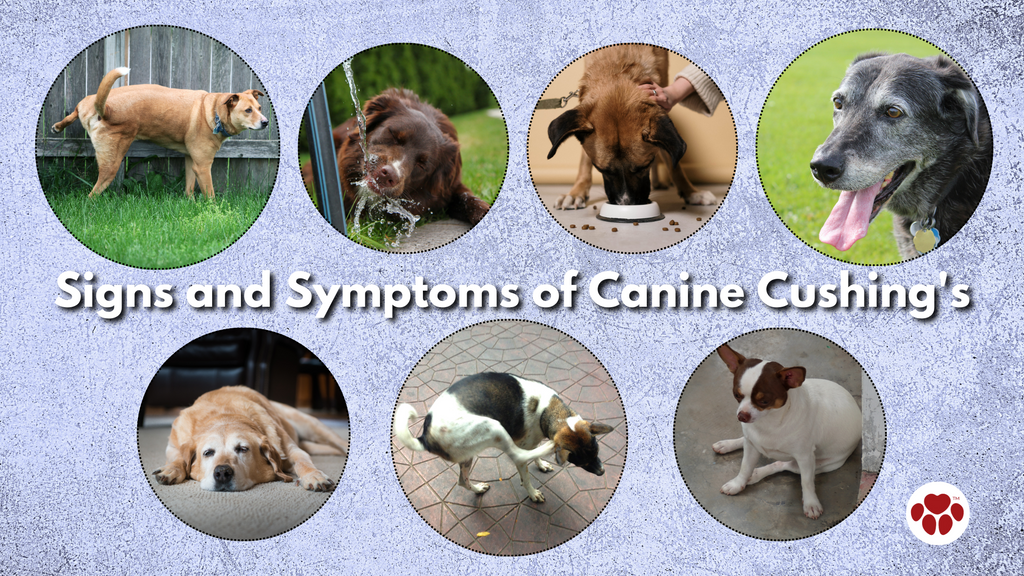 Signs and Symptoms of Canine Cushing's
Signs and Symptoms of Canine Cushing's
There are several symptoms associated with Cushing's disease in dogs. These include:
- Excessive urination
- Excessive drinking
- Increase in appetite
- Excessive panting
- Lethargy
- Skin problems (hair loss, thin skin, dry patches, dark spots, skin infections)
- Pot-belly
However, these symptoms do not necessarily mean your dog has Cushing's. Several other conditions have similar symptoms, which is why getting a proper diagnosis is so important.
Diagnosis and Treatment of Cushing's
Veterinarians will either do blood tests or an ultrasound to diagnose Cushing's. A common test is the ACTH stimulation test to test the hormone levels and check for imbalances. The vet may also do an ultrasound to determine the presence of a tumor and its size in the adrenal glands.
Once a proper diagnosis has been made, the veterinarian will prescribe treatment and management options:
- The pituitary-dependent variety is treated with medication.
- The adrenal-dependent form may also be treated with medication, and some cases require surgery to remove the tumor.
- For iatrogenic Cushing's syndrome, the treatment is complete elimination of the steroids.
There are only two drugs approved by the FDA to treat Cushing's disease. Vetoryl (trilostane) is approved to treat both adrenal-dependent and pituitary-dependent Cushing's disease.
It works by stopping cortisol production. However, it shouldn't be given to a dog that's pregnant, has a liver or kidney disease, or is on specific medication for heart disease. The FDA has approved Anipryl (selegiline) to treat the pituitary type Cushing's disease.
Managing a Dog with Cushing's Disease
Dog owners need to know how to manage their dogs to ensure that they live normal lives despite the diagnosis. Since the pituitary-dependent variety affects brain functions, it's crucial to manage any pain the dog may have and to provide relief from medication side effects such as diarrhea and vomiting.
Pet owners should regularly take their dogs for follow-up checkups and blood tests to see whether the medication is working.
With limited approved drugs for treatment, many pet parents are turning to alternative methods to provide relief for their sick dogs. Of these, one of the most popular is CBD.
What dog breeds are prone to Cushing's disease?
Although Cushing's disease in dogs is more common in older dogs, some breeds are prone to the disease regardless of age. These breeds include Boston terriers, dachshunds, Labrador retrievers, poodles, and golden retrievers.
Looking for a natural remedy for endocrine disorders? Check out Happy-Furever™ now!
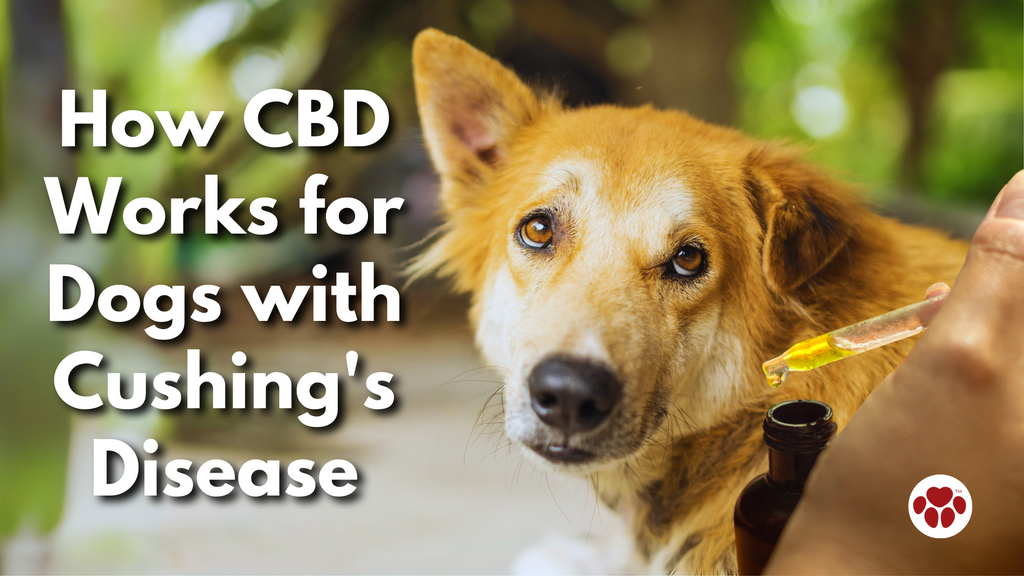 How CBD Works for Dogs with Cushing's Disease
How CBD Works for Dogs with Cushing's Disease
CBD is derived from hemp extract so is a pure, natural remedy. CBD oil for dogs works by stimulating the endocannabinoid system. This stimulation helps to relieve pain and discomfort in dogs. In the management of Cushing's disease, CBD oil helps to regulate your dog's appetite, reduce inflammation, and improve their overall well-being.
CBD Impact on Pituitary and Adrenal Glands
In pituitary-dependent Cushing's, the pituitary tumor in your dog can't be removed or cured. That's where CBD oil comes in handy as an alternative.
It works by affecting the endocrine stress axis which in turn regulates the hormonal imbalances. For adrenal-dependent Cushing's disease, CBD helps to regulate the cortisol levels in the adrenal gland.
CBD Dog Products
With CBD becoming a popular alternative for pet parents, there are many products in the market. The choice can be overwhelming. Please buy only quality products, as inferior ones can do more harm than good.
Some of the quality CBD products include:
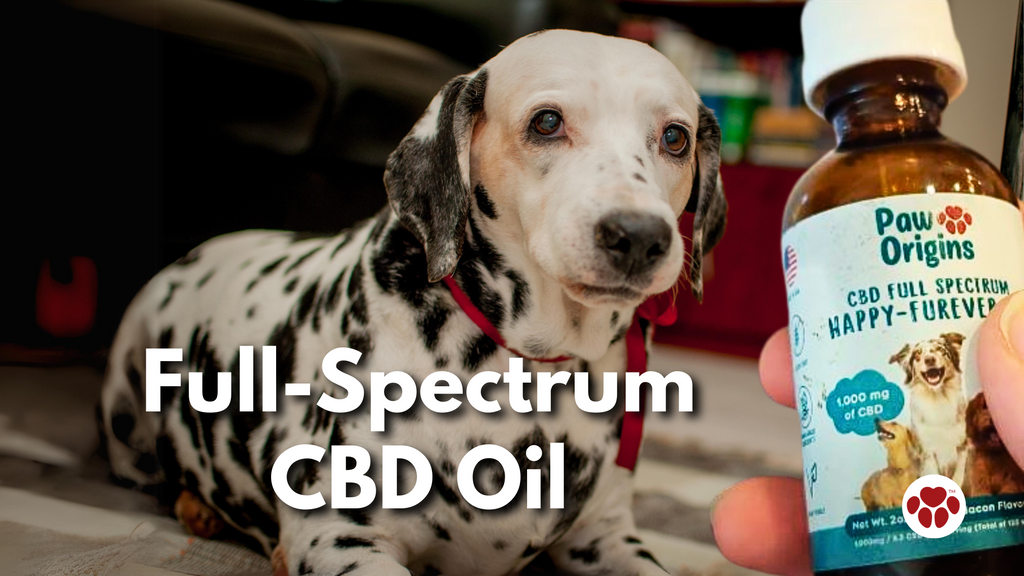 Full-Spectrum CBD Oil
Full-Spectrum CBD Oil
A full-spectrum CBD is made from full-spectrum hemp extract and contains less than 0.3% THC. It's approved by veterinarians, clinically-backed, and non-psychoactive. This makes it a safe and quality product.
For canine Cushing's disease, it reduces inflammation, relieves joint discomfort, and increases the quality of your dog's body tissues. Check "How CBD Oil Helps Your Dog With Joint Pains".
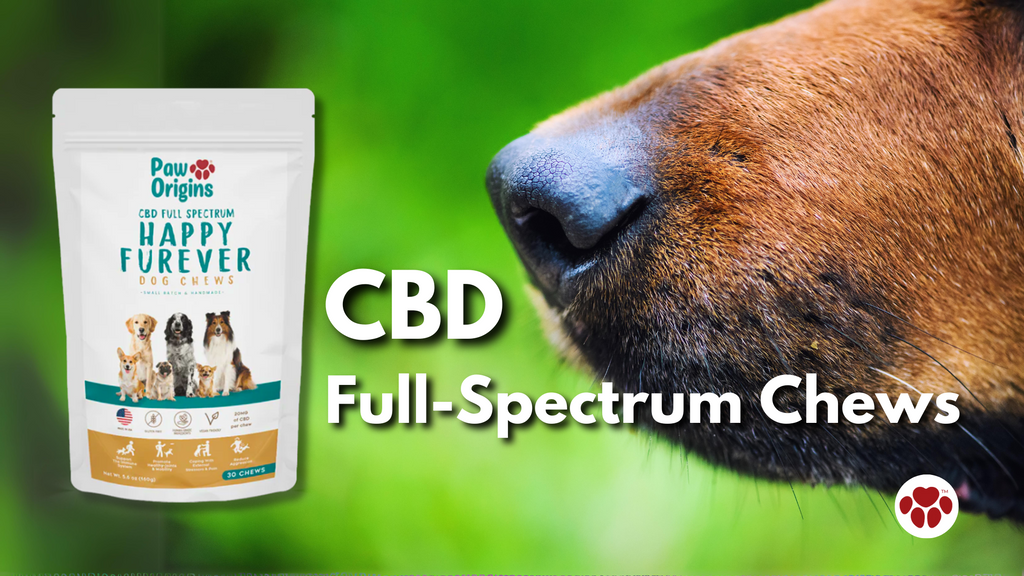 CBD Full-Spectrum Chews
CBD Full-Spectrum Chews
CBD chews are made of quality spectrum hemp extract and are backed by clinical research. For dogs with Cushing's disease, they aid with mobility issues and longevity, improve the immune system, and reduce inflammation.
Choosing Quality CBD Products
It's important to buy quality products to avoid THC poisoning. Before making a purchase, look out for the following:
- Full spectrum CBD oils. These contain all the beneficial properties of the hemp plant.
- THC levels. The recommended level is 0.3%.
- Natural, organic ingredients.
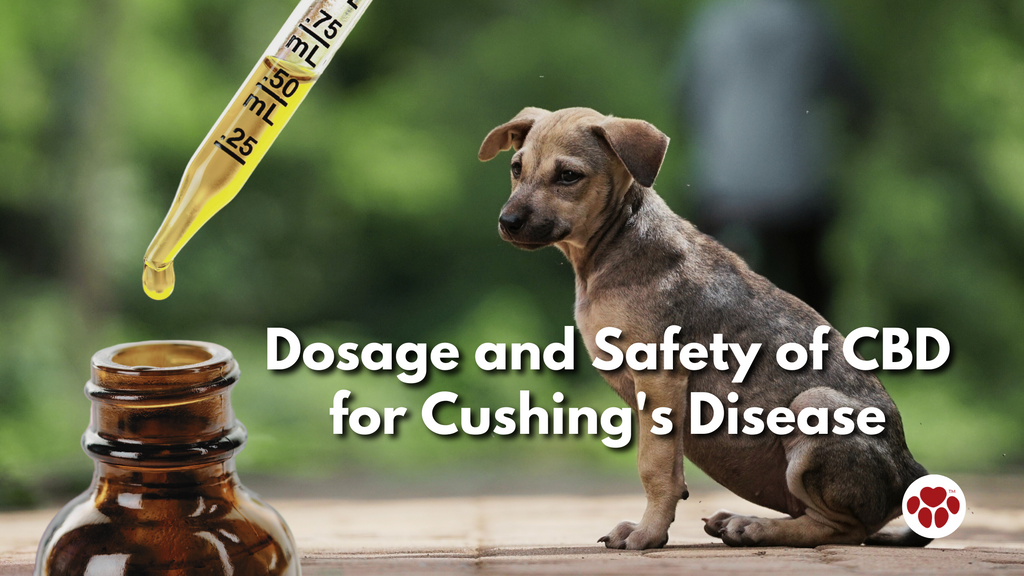 Dosage and Safety of CBD for Cushing's Disease
Dosage and Safety of CBD for Cushing's Disease
Before using CBD on your dog, you must consult with your veterinarian or an expert in cannabinoid therapy for pets first. These experts will determine the correct dosage for your dog depending on its breed, size, weight, and symptom severity. Also, they will help you to monitor your dog's progress.
When it comes to safety, CBD is considered safe for use in dogs. Although it's not approved by the FDA, it's a holistic alternative that has been used by many pet parents. Given in the right dosage, CBD is beneficial to your dog's overall health and well-being.
What are the side effects of CBD in dogs?
Although minor, CBD can have side effects on your dog such as an upset stomach or drowsiness. If you notice a serious reaction, stop using it and consult your veterinarian immediately.
What is THC poisoning?
While CBD is safe to use and doesn't have psychoactive effects on your dog, THC exposure doesn't just risk making your dog "high", it is toxic for dogs. When buying CBD products, look for those with up to 0.3% THC in their ingredients, which are known to be safe for our canine friends.
This consideration is important since CBD products aren't regulated properly and are not yet approved by the FDA. Using the wrong product can lead to THC toxicity and poisoning. Owners must also follow the right dosage as an overdose can lead to vomiting, diarrhea, and sleepiness.
If you notice the clinical signs of an overdose or are otherwise concerned, consult your veterinarian immediately.
 Conclusion: Can CBD be Used for Canine Cushing's Disease?
Conclusion: Can CBD be Used for Canine Cushing's Disease?
Using CBD to treat Cushing's disease in dogs is beneficial as it provides relief from discomfort and pain. It reduces inflammation and joint pain and improves the immune system and longevity.
CBD may help to shrink pituitary tumors and regulate the production of excessive cortisol. However, ensure that you buy quality products for therapeutic benefits. Also, strictly follow your vet's directions regarding dosage to avoid severe side effects and THC poisoning. Read about the "10 Reasons Why Your Dog Would Embrace CBD Oil's Benefits".















